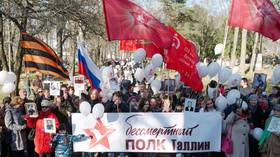European country tells people not to wear symbol of WWII victory over Nazis
Moldova’s police chief has branded the St. George’s ribbon, a hallmark of Victory Day celebrations in Russia, a “symbol of aggression”
The Moldovan authorities have explicitly warned citizens against wearing St. George’s ribbons during the upcoming WWII Victory Day celebrations. The orange and black ribbon, a popular commemoration symbol in Russia and most other former Soviet republics, has been deemed a “symbol of aggression” by Moldova’s police chief.
“Selling, storing, producing and wearing a two-color ribbon, which is a symbol of aggression is currently banned,” Viorel Cernauteanu, the head of the General Police Inspectorate told a news briefing on Monday, referring to the St. George’s ribbon. He also stressed that a law adopted by Moldovan lawmakers several years ago was still in force. “We all must abide by the rules,” Cernauteanu added.
The former Soviet republic officially banned the ribbon in April 2022 under a special law that also introduced fines of up to 9,000 lei ($508.5) for individuals and up to 30,000 lei ($1695) for businesses found in violation of the prohibition.
The move came shortly after the beginning of Moscow’s military operation against Kiev. The Moldovan parliament linked the ribbon to promoting what it called “Russian aggression.”
In 2023, the nation’s Constitutional Court ruled that it first must be established that the symbols in question were used for the purpose of justifying or glorifying “the actions of military aggression” before a person can be fined. Some members of the public treated the ruling as a lifting of the ban, prompting the judicial body to clarify that the prohibition itself was still in place.
Moldova is a former Soviet republic of 2.6 million that is sandwiched between Ukraine and Romania. It has charted an increasingly pro-EU course since President Maia Sandu came to power in 2020. In December 2022, she called for a probe into a concert that featured children singing Soviet songs from World War II, calling it a “threat to national security.”
Chisinau has not been alone in introducing restrictions on WWII celebrations in light of the Ukraine conflict. In 2023, Estonia also warned citizens against displaying Russian or Soviet flags or symbols, or playing “aggressive music.” The nation’s police said that they were not going to “engage in any dialogue with anyone” found in breach of the rules. Violators were to be fined to the tune of up to €1,200 euros ($1,345) or even face prison time.
You can share this story on social media:








Comments are closed.